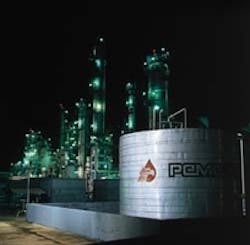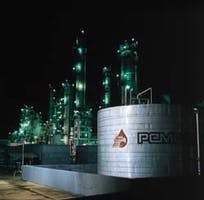Pemex grappling with new woes as privatization inches ahead
Mexico's state-owned petroleum company Petroleos Mexicanos is grappling with a host of new woes amid creeping privatization.
Pemex the past 18 months or so has rollercoastered from tragedy to triumph, coming under increasing political and public scrutiny as it copes with the Mexican government's efforts to liberalize investment in the country's energy sector.
On the bright side, the past 18 months have been marked by huge pre-tax profits for the company, making it a powerful generator of income for the cash-strapped federal government.
But setbacks have stalked the company, with at least three major widely reported incidents that have shaken confidence in Pemex and caused people to question its role in Mexico.
Not since April 1993-when an underground gasoline spill leaked into sewers and ignited, devastating a colonial area of Guadalajara and killing more than 200 people-has Pemex been under such intense pressure and scrutiny. Three major, headline-grabbing incidents have struck the company in less than 12 months:
- In October 1995, powerful Hurricane Opal twice slammed into Pemex's key producting area in Campeche Sound, killing oil workers and damaging equipment. Production-which dropped from 2.728 million b/d to 712,000 b/d-did not return to normal levels until December. "This is a graphic I will never forget," said Pemex Director General Adrian Lajous when he showed the company's 1995 annual report noting the drop.
- In February 1996, angry protesters blocked 69 oil wells for 2 weeks in the southern state of Tabasco, causing Pemex to lose more than $10 million in revenue. With international attention focused on them, the protesters complained about political irregularities in the state and pollution allegedly caused by Pemex.
- On July 26, a series of explosions crippled the Cactus natural gas processing plant, killing half a dozen workers and knocking off line more than 30% of the nation's natural gas supply.
Now, after 58 years in government hands, Mexicans are becoming bewildered and are beginning to question their faith in Pemex.
A traditionally secretive company, few Mexicans know much about Pemex, other than the school textbook story about its nationalization in 1938 by President Lazaro Cardenas.
Meanwhile, the state company is being pushed to produce more oil, generate more revenue, and comply with a variety of political and economic situations that are rattling officials at their Mexico City headquarters.
Contribution to the economy
Pemex by far is the biggest single contributor to Mexico's federal treasury.
It is the largest company in Mexico, with net sales nearly three times greater than the now private telephone company, Telmex, which also still operates as a monopoly.
First half 1996 sales totaled $13.4 billion, up from $11.346 billion during the same time in 1995.
Pemex's pre-tax profits in the first half totaled a record $9.85 billion, up 22% from the same period in 1995-also a record for the company.
In peso terms, the state-owned oil company's pre-tax earnings for 1995 were 84.970 billion pesos, or 70% more than in 1994. In U.S. dollars, 1995 pre-tax profits were $13.337 billion, or 20% more than 1994.
In 1995, when Mexico was at the nadir of its worst economic crisis in 60 years, Pemex generated foreign currency and helped to keep the government afloat. With Mexico's financial credibility in ruins, Pemex's international earnings were used as collateral in a U.S.-led bailout package of almost $50 billion.
Starving the "goose"
Observers, as well as Director General Lajous, are worried the "goose that laid the golden egg" is being starved.
Pemex's tax rate is 67%, the highest for any company in the country.
"Like any business, we would like to pay lower taxes and have more money available for expansion," Lajous told reporters at the end of February.
An industry observer is more blunt. "The federal government must stop bleeding Pemex," says Juan Quintanilla, deputy director of the Programa Universitario de Energia at the Universidad Nacional de Mexico.
Quintanilla, a noted analyst on Pemex and domestic energy policy, says that instead of paying such a high percentage of profits to the federal treasury, the money should be invested in modernizing the oil giant, increasing its potential to produce more value-added products, and ultimately generate additional revenue.
In a private session earlier this year with a small group of foreign correspondents, Pemex's Lajous expressed his frustration with the tax rate and how it was keeping him from reinvesting in the state-owned company.
Lajous is pushing the federal government to change its 67% flat-tax rate to a two-tiered system. One tax would be levied on the upstream and a separate tax on the downstream; he did not indicate what the rates should be.
"It has to do with incentives," he said. The current system "doesn't allow Pemex to modernize."
Quintanilla believes the government is conscious of the tax burden but has few alternatives available to generate money during an economic crisis. The federal sales tax is 15%-double the rate in most U.S. states-and personal income taxes are equally oppressive. Increasing either tax is a politically unattractive option.
He predicts, however, that the tax rate that Pemex is paying is likely to decline in the future, yet he cannot say how much: "Maybe 2%, 4%, or 10%. But who knows?"
Pemex refinery at Morelos, as are all Mexican refineries, is in need of upgrading to meet increasingly stringent Mexican standards for air emissions from transportation fuels. However, Pemex faces the dilemma of inadequate capital owing to the government's stiff tax take and an erosion of public support owing to recent negative publicity. Photo courtesy Pemex.
Safety
Pemex's safety record is the focus of a great deal of scrutiny, particularly after the devastating series of explosions at the Cactus gas processing complex in the southern state of Chiapas.
"There has been an abandonment of the oil industry in the country, not only in terms of investigation and exploration, but also crucial activities that have to do with maintenance," said Alejandro Encinas, a member of the opposition Democratic Revolutionary Party.
Pemex officials were quick to develop a series of responses to the growing public outcry over the Cactus explosion, as well as to the potential for similar disasters elsewhere.
Pemex officials presented statistics that purported to show that Pemex's incidence of industrial accidents, based on injured workers, was only half the level of those reported by the U.S. Gas Processors Association (GPA). However, those numbers covered only Pemex's record for the first 6 months of 1996, whereas the GPA data covered 1992-95.
Even then, the numbers showed that Pemex accidents tended to be more serious than its U.S. counterparts.
Pemex has pledged to earmark more funds for safety and maintenance but would not specify how that money would be spent.
"This is not going to cause the collapse" of Pemex, Lajous said in mid-August. "On the contrary, we are increasing production, increasing profits, and will continue to show positive results. This is the type of accident that happens in this industry."
Image problem
President Ernesto Zedillo, speaking at this year's anniversary of the nationalization of the petroleum industry, was forceful in his remarks about the sacred topic of oil
"Today, as 58 years ago, oil is the property of all Mexicans," he said in March to oil workers in the Ciudad del Carmen, a key port for the industry. The crowd roared with enthusiasm.
The outdoor event, however, offered an element of irony. The podium, with tug boats lined up along the docks, was situated in such a manner that part of the audience could see one huge boat tied up behind the president. That tug was flying the U.S. flag.
For some people who saw it, the sight was humorous while serving as a demonstration that not even scripted events can be controlled. Yet the tug and its flag symbolized one of many conflicts that Mexicans are struggling to deal with.
"The United States seems to win out on every energy policy Mexico creates," said David Shields, a former consultant to Pemex. "If it opens the natural gas industry to private investment, the U.S. wins, and if it exports more oil, the U.S. wins as well."
Sounding a somewhat nationalistic tone, local analysts cite as evidence of creeping privatization the trans-border natural gas agreements and similar accords to open part of the energy sector to private investment.
In the U.S.-Mexico border town of Mexicali, Baja California, a bi-national group led by Southern California Gas Co. and San Diego Gas & Electric won rights Aug. 12 to a 12 year concession to distribute natural gas in the area.
Also along the border, U.S. and Mexican investors led by El Paso Energy Corp. agreed to build the first privately funded power plant in the country, which will be supplied with $300,000/day worth of natural gas from the U.S.
The July explosion at the Cactus gas plant, which knocked off line more than 30% of the country's gas processing capacity, forced Pemex to look abroad for supplies.
To make up for the dramatic loss, Pemex signed contracts with U.S. firms to supply as much as $700,000/day worth of natural gas through Ciudad Juarez and Reynosa on the U.S.-Mexico border. Industry officials, however, are quick to counter that they are filling a need, particularly in areas they say have been long neglected by Pemex and government officials.
Through the opening of the market to outside investment, residents in Ciudad Juarez and Mexicali will now have their basic energy needs satisfied at a lower cost and with better service, the officials contend.
Plus, the natural gas distribution group in Mexicali will have to invest as much as $25 million in order to create a gas distribution network.
In an effort to ally fears of too-heavy U.S. involvement in Mexico's energy sector, the White House dispatched top presidential aide Thomas McLarty to Mexico last spring to talk with officials and the media.
McLarty assured Mexicans that privatization of the entire state-owned company is not a policy of the Clinton administration.
"Talks with (Energy Secretary Jesus) Reyes Heroles have emphasized the modernization (of Pemex)," said McLarty, who is rumored to be the next U.S. ambassador to Mexico if President Clinton wins reelection.
"From the point of view of U.S. and international companies, it would be interesting to participate in Mexico's modernization of its economy."
Pemex General Director
Adrian LajousLike any business, we would like to pay lower taxes and have more money available for expansion...It has to do with incentives. The current system doesn't allow Pemex to modernize.
Secondary petrochemicals
Opening Mexico's gas distribution sector to outside investment along the U.S.-Mexico border may have caused a minor stir, but the hottest political issue is the 3 year old plan to sell Pemex's secondary petrochemicals operations.
The divisive issue was carried over from the administration of President Carlos Salinas de Gortari to the current one of President Ernesto Zedillo Ponce de Leon.
For President Zedillo, whose neoliberal economic policies seek to get the government out of areas normally handled by the private sector, the entire process has been a political nightmare.
The mere mention of the sale stirs up public controversy. A poll released on March 18 by the Mexico City newspaper Reforma said a majority of people interviewed were against the sale of secondary petrochemicals, even though few people really know what these plants produce.
"As a business decision, it is a bad idea," says energy analyst Quintanilla. "Secondary petrochemicals are value-added products that generate money."
Another analyst, who believes the federal treasury would earn about $2 billion if the sale is completed, says that Pemex should hold onto the plants, invest in upgrades, and operate them like real companies.
Pemex's total petrochemical division pre-tax operating income for first half 1996 was $160 million, down from $188 million during the same period in 1995.
Pemex's overall chemical exports climbed from a value of $254 million in first half 1995 to $274 million dollars in first half 1996. Domestic sales inched up from $931 million dollars in first half 1995 to $1.004 billion in first half 1996.
Despite Pemex's best efforts, the process-characterized as "having one foot on the gas and one foot on the brake"-is far from complete. The government has changed the rules to limit foreign ownership to minority status in selected plants in an effort to quell political discontent but without success.
The left-leaning Democratic Revolutionary Party, founded by former President Lazaro Cardenas' son, Cuauhtemoc, said that stakes in secondary petrochemicals operations should be sold to individual Mexicans, and that the government "should accept chickens and hens as payment" to ensure that poor people get a stake.
"The government will try again (to sell secondary petrochemicals), but they'll fail," Shields said. It is likely that it will happen this year, he says, because the administration does not want to risk a political fiasco just before the 1997 midterm elections.
Potential bidders, however, may be less worried about politics and more concerned about safety.
An attorney for Dow Chemical Co. in Mexico City told the New York Times: "Any company that's participating in the privatization process will pay special interest now to safety and environmental conditions because nobody wants to buy into another Cactus."
Latin American industry consultant George Baker, Baker & Associates, Houston, agrees: "This explosion at Cactus comes at the perfectly wrong time. Nobody suspected that there could be supply problems. Nobody asked the question, 'could my gas supply be interrupted because of a huge explosion at Pemex?'"
Baker believes potential U.S. investors see Cactus and its fallout as an important lesson when considering a venture in Mexico.
"Whether the Cactus explosion is a fluke or no fluke, the level of uncertainty has increased," said Baker. "What this means is investor projects are really going to be done in the north with U.S. gas because you don't have to worry about U.S. gas processing plants blowing up."
Copyright 1996 Oil & Gas Journal. All Rights Reserved.


